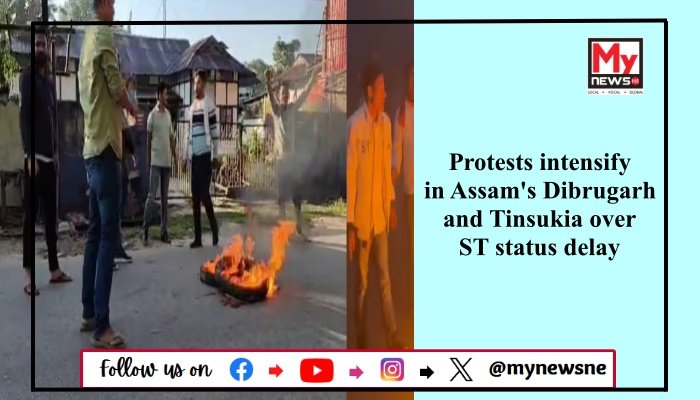Assam Protests Escalate as Moran and Motok Communities Demand Scheduled Tribe Status
Dibrugarh/Tinsukia: Protests intensified across Assam’s Dibrugarh and Tinsukia districts today as the Moran and Motok communities amplified their long-standing demand for Scheduled Tribe (ST) status.
The demonstrations, marked by roadblocks, tyre burnings, and widespread disruptions, reflect the communities’ frustration with the government’s prolonged delay in addressing their demand for ST recognition.
The protests have effectively brought both districts to a standstill, with local authorities declaring closures and implementing emergency measures to control the unrest. The All Moran Students’ Union (AMSU) and the All Assam Motok Yuba Chatra Sanmilan (AAMYCS), prominent student organizations advocating for the communities’ rights, organized a 12-hour bandh on November 11, calling attention to what they perceive as an urgent issue.
District Commissioner Bikram Kairi of Dibrugarh imposed prohibitory orders banning unauthorized protests, roadblocks, and tyre burnings, warning of legal consequences for violations.
Similarly, the Tinsukia district administration invoked Section 163 of the Bharatiya Nagarik Suraksha Sanhita, 2023, which restricts public disturbances, and bolstered security by deploying additional personnel throughout the district.
Authorities have activated a helpline for residents affected by the protests and stationed police and magistrates in sensitive areas to maintain order.
In Digboi, members of the Moran Students’ Union escalated their protests, burning effigies of Prime Minister Narendra Modi, Union Minister for Tribal Affairs Jual Oram, and Assam Chief Minister Himanta Biswa Sarma. The act underscored the community’s frustration with what they perceive as government apathy toward their demand for ST status.
The push for ST recognition by the Moran and Motok communities has gained momentum in recent years, with both groups advocating that the status would safeguard their cultural heritage, provide educational and economic benefits, and offer protections to uplift their communities. However, delays in the recognition process have fueled unrest, with protest leaders arguing that government inaction risks further marginalizing these indigenous groups.
As the protests continue, local authorities face mounting pressure to address the communities’ demands, with public sentiment in the affected districts reaching a boiling point.
Read More: Assam Woman Fatally Stabbed in Kerala; Accused Attempts Suicide, Undergoes Treatment

